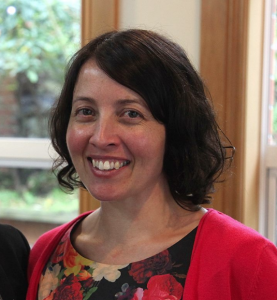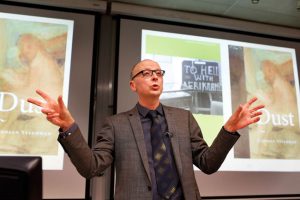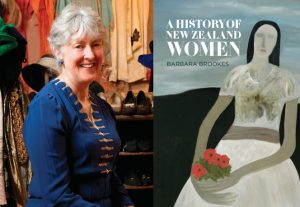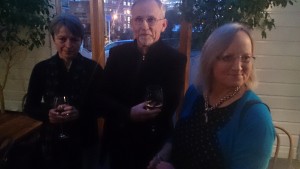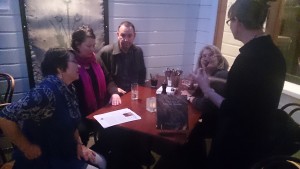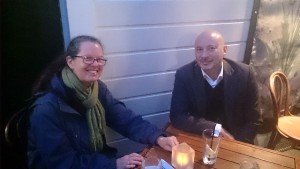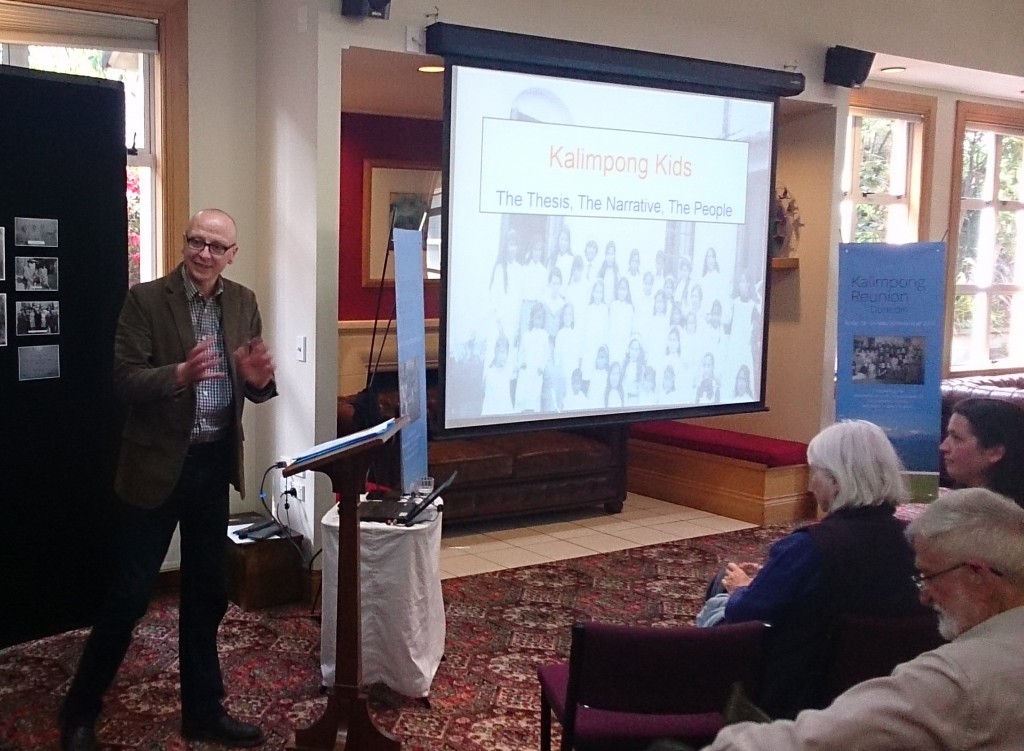New Book on Religious Childhoods
Creating Religious Childhoods in Anglo-world and British Colonial Contexts, 1800-1950 is a new co-edited collection from Centre member, Hugh Morrison, and Mary Clare Martin (Greenwich University, UK). This new book, published by Routledge, features children and religion in colonial society contexts such as New Zealand, and aims to develop greater understanding of religion as a critical element of modern children’s and young people’s history.
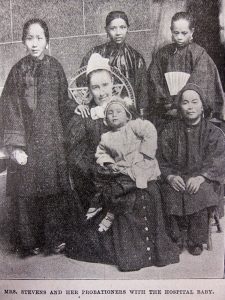
‘Mrs Stevens and her probationers with the hospital baby’, alongside article by Mary Budden, ‘Almora Christian Families’, in LMS Chronicle, July 1895, p. 182 (from Chapter 1, p. 27)
Arguing that religion was an abiding influence (positive, negative and benign) among British-world children throughout the nineteenth century and much of the twentieth, the book places ‘religion’ at the centre of analysis and discussion, while at the same time positioning the religious factor within a broader social and cultural framework. Essays written by an international grouping of scholars focus on a range of geographical settings: America, Australia, Britain, Canada, Fiji, India, New Zealand, South Africa and the South Pacific. The various contexts within which religion shaped childhood in these settings – mission fields, churches, families, communities, institutions, camps, schools and youth movements – are treated as ‘sites’ in which religion contributed to identity formation, albeit in different ways relating to such factors as empire, nation, gender, race, disability and denomination. Chapters on New Zealand include: an examination of southern Dunedin’s religious identity; children’s religious literature published by A.H. & A.W. Reed; and the ways in which religious identity was conflated with civic qualities of sacrifice and service.
Ernest Scott Prize 2016
The shortlist for the Australian Historical Association’s prestigious Ernest Scott Prize has been announced. On the list is the Centre’s director, Professor Tony Ballantyne, for his book Entanglements of Empire: Missionaries, Māori and the Question of the Body (Auckland University Press, 2015). The Ernest Scott Prize is awarded to the book that has made the most distinguished contribution to Australian or New Zealand history or the history of colonisation.
The judges describe Entanglements of Empire as “a smart, engaging and intelligent new work, which carefully blends New Zealand historical research with new theoretical readings inspired by international scholarship. Pushing disciplinary boundaries, its novel approach in reading the early Missionary-Maori dynamic in a new light, makes this book a new spin on an ‘old’ topic. Employing new frames of reference, guided by a focus on spatial interaction and physical embodiment, this book will invite further re-readings of the early colonial encounter period in New Zealand. Elegantly written, grounded in solid primary research, Entanglements of Empire is focused on re-thinking the history of early colonial New Zealand.”
The winner will be announced at the Kathleen Fitzpatrick Lecture, University of Melbourne, on 26 April.
Congratulations Tony, and good luck!
Ringing in the New Year
It’s that time of year – time for the annual blog post on Centre activities, forthcoming publications, and other exciting news from our members.
Helen May’s year started with the award of a new years honour for services to education, becoming an Officer of the New Zealand Order of Merit.
Hugh Morrison has a new book appearing with Otago University Press in February called Pushing Boundaries: New Zealand Protestants and overseas missions, 1827–1939 and it will be launched in early April. He has also accepted an invitation to join the Grace Abbott Book Prize Committee (international Society for the History of Children and Youth), to decide on the “best book in the field published in English over the previous year”.
In February the Centre is hosting the Making Women Visible Conference, which honours Barbara Brookes, and features the launch of her new book, A History of New Zealand Women, on the conference programme.
In December Tony Ballantyne was awarded the W. H. Oliver Prize by the New Zealand Historical Association for his book Entanglements of Empire, published by Auckland University Press. In November Tony gave a keynote at the Race, Mobility and Imperial Networks Conference in Melbourne. He has contributed a chapter to How Empire Shaped Us (Bloomsbury) and his co-edited book with Antoinette Burton, World Histories from Below (Bloomsbury), will appear in September.
Tom Brooking is on Research and Study Leave, and will spend some time at the Rachel Carson Centre for Environment and Society in Munich, and as a visiting scholar at Sidney Sussex College, Cambridge University.
Angela Wanhalla and Lachy Paterson were promoted to Associate Professor.
Angela Wanhalla is co-organising the Making Women Visible Conference, and in October 2015 replaced Tony Ballantyne as co-editor, with Barbara Brookes, of the New Zealand Journal of History.
Annabel Cooper was one of four scholars awarded the inaugural University of Otago Prestigious Writing Grant to complete her book Screen Wars: Remaking the New Zealand Wars in Celluloid and Pixels, which charts changes to screen narratives about colonial conflict from the silent film era to the age of the phone app.
In 2015 Megan Pōtiki contributed an essay to a special issue of the New Zealand of History dedicated to Māori history, as did Michael Stevens.
The April 2016 volume of the New Zealand Journal of History is a special issue dedicated to ‘New Zealand Sexual Histories’. It is co-edited by Chris Brickell and Angela Wanhalla, and is an outcome of the workshop, supported by the Centre, they co-convened in July 2015.
Judy Bennett contributed a chapter to New Zealand’s Empire (Manchester University Press), co-edited by Katie Pickles and Cathy Coleborne. In 2015 the Chief of Army (Australia) invited Judy to address the Chief of Army History Conference in Canberra, on the theme Geo-Strategy and War: enduring lessons for the Australian Army, held at the Ballroom, National Convention Centre, 30 September-1 October. She spoke on “South Pacific: Using Indigenous resources in the Second World War”. Following the open conference, Judy also contributed to a ‘closed’ one-day teaching-learning session on scenarios for possible military and civil disturbances that may involve the Australian armed forces in the region, including the Pacific. Her visit was fully funded by the Chief of the Army.
Congratulations to all!
Wellington celebration
The Centre would like to thank Professor Charlotte Macdonald who organized a celebration for The Lives of Colonial Objects on Monday evening at the Thistle Inn in Wellington.
Folk from the capital (from VUW, Te Papa, and others) are well represented in the book, and it was a great opportunity to come together, along with friends and colleagues. Two of the co-editors, Annabel Cooper and Lachy Paterson, were able to attend from Dunedin. He mihi nunui, Charlotte, for your passion and your hospitality.
Soldiers of Empire Marsden Project
We’d like to congratulate our colleague Professor Charlotte Macdonald (Victoria University of Wellington) on her Royal Society of New Zealand Marsden Project, Soldiers of Empire, and alert you to the project website. Charlotte is working with Dr. Rebecca Lenihan “to put a face to the British army and navy presence in New Zealand. In doing so we aim to link the service of men in this part of the world to the wider British empire. Our interest focuses on the ways in which war takes people, goods, ideas and habits around the world. Engaged to suppress resistance to British expansion, the armed forces also served as vectors of empire. We are focusing on the world beyond the battlefields.” We encourage all interested in the project to look at their fantastic website, and bookmark it so you can keep up-to-date on the progress of their research.
Orphanages, Residential Schools, Colonial Gossip
All of these topics will be discussed at a half-day symposium on “Colonial Families: New Perspectives” taking place on Thursday 20th August from 9-12 in Central Library Seminar Room 3, University of Otago. This event is sponsored by the Centre for Research on Colonial Culture, with support from a Royal Society of New Zealand Rutherford Discovery Fellowship and features four speakers who will present new research into the history of the family in Canada, New Zealand and the Pacific:
Laura Ishiguro’s (University of British Columbia) research is trans-imperial and global in scope. She will speak about colonialism, mobility, and intimacy in the “long” nineteenth century through the story of one Metis family from British Columbia. Her talk draws upon her SSHRC-funded research project, “Settler colonialism, global families, and the making of British Columbia, 1849-1871″ (Insight Development Grant 2014-16). She guest-edited a 2013 issue of the Journal of Colonialism and Colonial History on “Imperial Relations: Histories of Family in the British Empire,” and in it called for a rethinking of the meanings of, and relationships between, family, intimacy, and imperialism.
Crystal Fraser (University of Alberta) is a high-profile young Gwich’in scholar who is undertaking research on the impacts of colonialism on her home community, Inuvik, located in northern Canada. She has been identified as “one of the most important Canadian historians of the next generation” whose research on residential schools, gender, and sexuality in Gwich’in society and the Canadian North is “actively shifting both fields as aboriginal people and northerners start writing and directing research in their own history on their own terms”. She is also a leading voice in Indigenous social media, which included hosting @IndigenousXca where she discussed racism in Canadian academia. Crystal will speak about the current debates within Canadian history and society about residential schooling.
Jennifer Ashton (Auckland) will speak about family, race and respectability in northern New Zealand during the nineteenth century. Jennifer’s talk draws from her recently published, and highly regarded first book, At the Margin of Empire: John Webster and Hokianga, 1841-1900 that “takes us into Hokianga to reveal how the evolving intimate relationships and economic transactions of everyday life reflected larger shifts in colonial power” through a biography of the trader and colonist John Webster and his networks.
Erica Newman (Otago) will talk about her original and exciting doctoral research on orphanages and adoption in colonial Fiji. Erica’s research in this area has been recognized internationally in the form of invitations to participate in pre-read workshops at the Berkshire Conference of Women Historians, and an invited publication on her previous work on Māori adoption in the highly regarded American Indian Quarterly.
Contact Dr. Angela Wanhalla (angela.wanhalla@otago.ac.nz) for further information about this free event.
Hocken Lecture
Tony Ballantyne, the incoming PVC Humanities at the University of Otago, departing HoD of History and Art History, and Director of the Centre for Research on Colonial Culture gave the 2015 Hocken Lecture last week. In it, Tony discussed some archive stories that are foundational to his own work, and critiqued claims about archival silences promoted by some postcolonial scholars by pointing to the lively and rich vein of work being produced at the University of Otago, particularly by researchers attached to the Centre. You can read about his lecture in this Otago Bulletin article, which gives a thorough report on its content and maps out Tony’s vision for New Zealand history. Thanks Tony for a wonderful lecture!
Super-Fabulous News
The Centre is absolutely delighted to hear that its Director, Professor Tony Ballantyne, has been elevated to the position of Pro-Vice Chancellor Humanities at the University of Otago. We’d like to extend our congratulations to Tony and wish him all the best in his new role, which begins on 1 October 2015. Tony’s new role will bring new challenges, but we are pleased he will remain a vital part of the Centre’s leadership and continue to participate in the Centre’s activities. YAY TONY!!!

